In a video interview recorded in the early weeks of the coronavirus outbreak, philanthropist Melinda Gates voiced what many with an interest in Africa were thinking.
“When I saw what China had to do to isolate an enormous part of their population, my first thought was: Africa. How in the world are they going to do deal with this?”
Gates’ concerns were broadly justified. The fear, particularly widespread in the public health and development NGO circles, was that the continent’s fragile health systems would be easily overwhelmed if the pandemic took hold in a few large countries.
Three months after the first incidences of Covid-19 were recorded in Egypt, Nigeria, and South Africa, the confirmed case numbers have topped 125,000, with the number of deaths around 4,000, as of May 27. No country has seen exponential growth in case loads, yet, perhaps due to the way the pandemic has rolled out across the continent, and the quick reaction on the parts of governments used to devastating outbreaks. But bigger outbreaks remain a real possibility.
This health emergency has rapidly spiraled into Africa’s worst economic crisis in 25 years. The global downturn has brought to the continent economic collapse, commodity price drops, currency devaluations, border closures, and a near-total shutdown of the vital informal sector.

Table of contents
The end of a growth streak | Debt’s “ticking bomb” | Free trade’s promise | Making it up | Investors’ gamble | Getting digitized | Locked-down economies

The end of a growth streak
The World Bank had expected the sub-Saharan Africa region to grow by 2.4% this year. Now, it forecasts a reversal of years of economic growth, with the rate plunging to between -2.1% and as low as -5.1%. The IMF sees a marginally better -1.6% shrinkage for the subregion. The UNDP has predicted nearly half of all jobs in Africa could be lost due to the crisis.
Discussions have moved quickly to the potential for a humanitarian disaster if care is not taken. The UN Economic Commission for Africa estimates between 300,000 and 3.3 million people could lose their lives if appropriate surveillance, monitoring, containment, and mitigation interventions are not undertaken effectively.
Presidents, lawmakers, economists, central bankers, business people, and ordinary citizens across the continent are all asking the same thing as Melinda Gates: How in the world do we deal with this?
The Sub-Saharan region had been growing at a steady clip for the last two decades, even through the difficult 2008-2009 financial crisis. That was in part driven by the fact that it was home to several of the world’s fastest-growing economies, particularly for the last decade. Ghana, Kenya, Senegal, Rwanda, Ethiopia, and Côte d’Ivoire were posting growth rates between 5% to 10% fairly regularly in this period. These are also among the region’s more diversified economies.
Other commodity-driven economies, led by Nigeria and Angola, enjoyed a series of boom years, but have been struggling with middling oil prices since about 2014. Nigeria, the continent’s largest economy, went through a full recession in 2016, and is expected to get particularly badly hit by the pandemic’s economic impact, as oil prices dropped 50% since the start of the year, making it almost unprofitable to even extract a barrel of oil.
South Africa, the continent’s second largest, and most advanced, economy has also been stuck with anemic growth for the last few years. It was slowly starting to emerge from a recession this year but is now clearly heading back into much sharper negative growth. Early projections by the South African Reserve Bank say the country could lose 370,000 jobs this year, while private banking analysts see a GDP contraction of -7% during 2020. This could lead to a fiscal deficit of 12% of GDP, compared with a forecast of 6.8% in the 2020 budget.
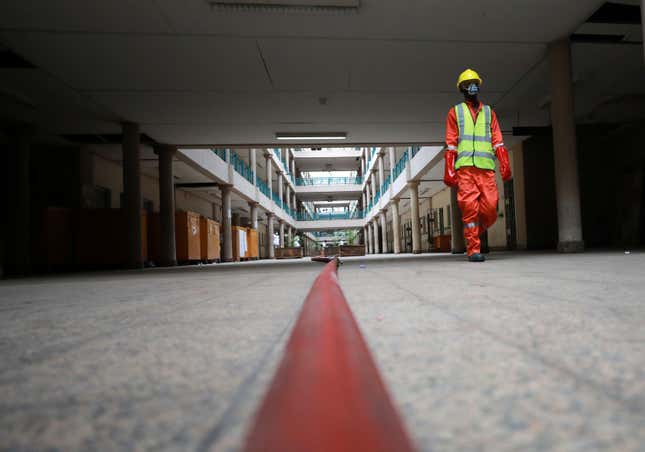
And when South Africa sneezes, the Southern African Development Community (SADC), a collective of 16 countries, is almost guaranteed to catch a cold.
As they try to prevent a highly infectious virus from rampaging through their borders, African leaders are having to simultaneously protect their once-promising but vulnerable economies from the potentially devastating impact of domestic lockdowns, international trade restrictions, and mounting debt loads.
And yet, both political and business leaders are also being encouraged to grab this once-in-a-century opportunity. The pandemic has offered a chance to transform their countries with innovation, imagination, and a bit of risk-taking to become more self-reliant, sustainable, and perhaps even prosperous.

Debt’s “ticking bomb”
Africa’s mounting sovereign debt has been one of the most difficult issues in the run-up to this moment. After the 2008 financial crisis, several countries were able to access cheap debt, not just from traditional multilateral lenders like the World Bank and IMF, but through private creditors as well. Over the last decade, private institutions, in the search of better returns than what could be found in the low interest environments of Europe and North America, have been a source of much needed funds by investing in African eurobonds and treasuries. Africa’s debt load has soared some 150% to over $583 billion in 2018 from $236 billion 10 years earlier, according to World Bank data.
The World Bank has classified the African countries into different groups, depending on how cavalier they have been when it comes to debt. Sudan (with debt at 200% of GDP), Mozambique, Angola, and Zambia lead the group of “heavy borrowers”.
One of the early voices of concern on this issue was Trevor Hambayi, an economist and senior partner at Development Finance Associates, a non-profit in Zambia. Back in 2016, Hambayi warned about the mounting debt problem—calling it a “ticking time bomb.” “It was already quite evident many African countries were facing debt distress,” prior to the pandemic, Hambayi says. Sudan, South Sudan, Chad, Mozambique, and Zimbabwe had already defaulted on their debt in recent years, and another nine could be classified as being in “high debt distress.”
IMF Africa director Abebe Aemro Selassie was another early voice of caution. But he acknowledges that the coronavirus crisis has changed the conversation “significantly.” Previously, the focus was on stabilizing mounting public debt. Now, there are “calls for a more supportive fiscal stance,” Selassie says—the goal being that debt stabilization shouldn’t come at the expense of public health spending or economic relief. “This is what we have been advocating and providing financing towards.”
The IMF has provided emergency financing to 26 Sub-Saharan Africa countries and debt relief to 19 countries, in the amount of nearly $10 billion. The World Bank is deploying up to $160 billion in financial support for developing countries over the next 15 months to help protect the poor and support businesses.
While the total amount of principal debt amassed over the last decade is a foreboding figure, the more immediate concern for finance ministers is the debt repayments due now. The pandemic has exposed how little budgetary flexibility African countries have for major health and social spending emergencies after making their quarterly or annual debt repayments. This has prompted calls for the suspension of debt repayments for two years to allow low-income countries to get through this period.
“Because Sub-Saharan Africa governments do not have the resources for significant fiscal stimulus programs, we think suspending governments’ interest payments is critical,” says Yvonne Mhango, an analyst at Renaissance Capital. “Ghana spends five times as much on interest payments as it does on healthcare. Freeing up these funds would help alleviate the impact of the crisis.”
Talks with multilateral creditors have been mostly positive, though still unresolved. But there are concerns about the discussions with private creditors, who have formed a working group based in London to negotiate with African countries. These negotiations won’t be easy, even with the African Union’s high-profile and vastly experienced special envoys: former Nigerian finance minister Ngozi Okonjo Iweala, French-Ivorian former Credit Suisse chief executive Tidjane Thiam, ex-African Development Bank chief Donald Kaberuka, and Trevor Manuel, South Africa’s ex-finance minister.
“This operational task force is working day and night negotiating on behalf of the governments,” says Lionel Zinsou, a former prime minister of Benin and managing partner at Southbridge, a pan-African investment bank. “The talks are going pretty fast and well because ultimately the flows of the African debt service are not that huge. It’s progressing better than was expected.”
African governments are in a tight spot. They need to fulfill their health and social spending obligations while avoiding a default to private creditors, who have been an important funding option for critical infrastructure projects.
“There are billions due this year in debt servicing and further maturities to come, so the longer it takes to finalize and implement an agreement, the more of their limited resources African countries will be forced to use to service that debt,” says W. Gyude Moore, a fellow at the Center for Global Development.
The elephant in the room is China, Africa’s largest trading partner and the holder of large chunks of bilateral debt with many countries, estimated to be around a fifth of all public debt in African countries on average. The debt, a mix of infrastructure-related loans and commodity-linked transactions, have lacked transparency and been the target of criticism by the Trump administration and World Bank chief David Malpass (whose nomination to the role was supported by the Trump).
The ballooning of Chinese debt is of significant domestic concern in several African countries, where local opposition politicians and civil society activists have framed the topic in neo-colonial terms, or as a threat to national sovereignty. [Read more about how the coronavirus pandemic is resetting relations with China.]

Free trade’s promise
The entire world has been hit with a cascade of bad economic news in recent weeks, but much of it has focused on the impact on the status quo. For some observers, the worst news regarding Africa has been the impact on positive changes that were on the brink of happening.
The Africa Continental Free Trade Area (AfCFTA) agreement was passed last July at the African Union (AU) after years of negotiations. It aims to create the world’s largest free trade area since the World Trade Organization. In its simplest terms, it would start to help to create a platform for seamless trade between the 54 member states of the AU.
For various colonial, historical, and infrastructural reasons, Africa has long been the least regionally integrated continent. Many countries within the continent are more likely to trade with Europe, North America, or Asia before they trade with their own immediate neighbors.
It’s a simple gambit, that creating a $3.4 trillion market of 1.3 billion people will help trigger industrialization and manufacturing across the continent and, in turn, enable vast employment opportunities on a continent home to the world’s fastest-growing labor force. If signatory countries follow through with policies that spur local productivity, the free trade agreement could boost intra-African trade by 52% by 2022, according to estimates by the United Nations Economic Commission for Africa (UNECA).
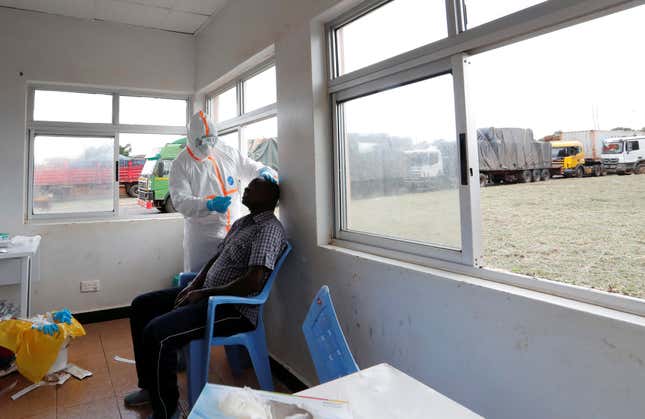
But the agreement’s implementation, scheduled for July 1, has reportedly been put on hold. While the delay is yet to be confirmed by the AU, officials have gone on the record to point out the difficulty of moving forward with opening up a free trade area while local lockdowns and restrictions are in force across the continent.
The agreement’s biggest supporters are urging for its implementation to go ahead, even if it is partial.
“The Continental Free Trade Agreement can be one of the most important tools of our economic recovery,” says Paulo Gomes, a former World Bank executive director who chairs the executive committee of AfroChampions, an African Union-mandated network to coordinate private sector discussions around AfCFTA. “If I’m an African finance minister, I don’t have quantitative easing and the money-printing money tools of the wealthier economies—trade can be our stimulus.”
“We need to see Covid-19 as a wake-up call for more rapid implementation of the AfCFTA,” says Jakkie Cillers, a founder and former executive director of the Institute for Security Studies based in Pretoria, South Africa. “It goes beyond just leapfrogging and industrialization.” That opportunity is clear to global consultants at McKinsey, who highlight its potential in a recent paper on how African economies can reopen as the crisis subsides. “We need to accelerate the implementation of the AfCFTA and deregulation,” partner Acha Leke argues.

Making it up
The most significant impact of AfCFTA, arguably, would be the revival and expansion of Africa’s depleted manufacturing base. No continent has been as cruelly exposed by the lack of a homegrown manufacturing base during the current crisis than Africa.
Individual countries have had to rely on the generosity and goodwill of nations around the world for everything from basic personal protective equipment to hand sanitizer. As much as 94% of pharmaceuticals are imported from outside the continent, according to UNECA (pdf). “We see AfCFTA addressing this pharmaceutical challenge and believe [it] will help play a role in securing our health systems,” says Stephen Karingi, UNECA’s director of the regional integration.
It’s not just about the cost. Many countries have restricted exports of essential items such as testing reagents in order to ensure there is enough for their own citizens. “African countries have funds to pay for reagents but cannot buy them,” says John Nkengasong, head of the Africa Centres for Disease Control.
Africa has had several false dawns as the world’s next manufacturing hub over the last decade. But the crisis has exposed a deeper problem about how a continent with massive unemployment and millions of skilled and unskilled young workers has tried and failed to leapfrog basic industrialization, despite the availability of stop gaps like 3D printing and special economic zones.
The share of manufacturing in Africa’s GDP has fallen on average since 1980, says Brookings Institution fellow John Page, a former World Bank director. “Services—some with quite low productivity—absorb the bulk of African workers leaving agriculture and moving to cities,” Page says. “These differences reflect the impact of technological progress, a changing global marketplace, and natural resource endowments on Africa’s industrialization prospects.” But Page emphasizes that most of these jobs are what he calls “industries without smoke stacks” in four main areas: horticulture and high-value agribusiness, tourism, business services, and other tradable services, such as transport and logistics.
McKinsey estimates that for every dollar of manufactured product, Africa imports approximately 40 cents in inputs from outside the continent, higher than most other regions in the world. “Over five years, a serious push to reduce reliance on global supply chains could add an initial $10-$20 billion to the continent’s manufacturing output if 5% to 10% of imported intermediate goods can be produced within the region,” says Leke.
That focus on strengthening supply-chain resilience, particularly under the framework of the AfCFTA, could also benefit exporters in countries experiencing currency devaluations, says McKinsey. If local manufacturers could capture the upside of increased export attractiveness without the additional costs of their imported inputs becoming more expensive, they would benefit greatly.
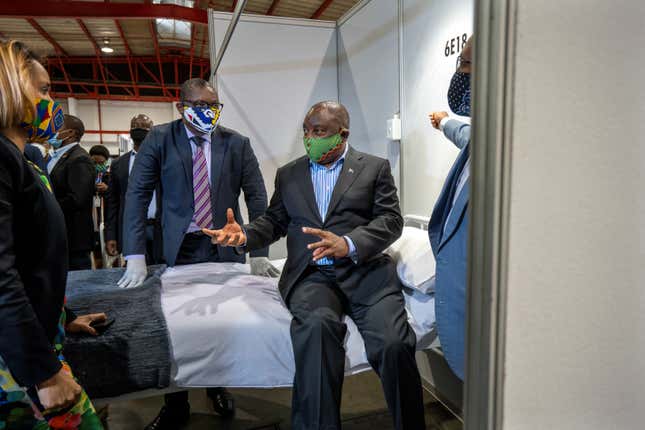
AfCFTA might not have the kind of impact its supporters hope, warns Moore of CGD. Many of the fundamental challenges of manufacturing in Africa haven’t gone away, even though they have become more imperative in a post-Covid world. The most significant are the cost of labor relative to other markets and the weakness of both hard and soft infrastructure.
“Most African countries cannot match Bangladesh on wages, infrastructure, regulations,” Moore says. “Bangladesh is considered your entry point into textile and other low-level manufacturing. I agree the opportunity is there, but I can’t say with confidence that we will take advantage of it.”
And the reality on the ground shows what a long and hard slog it for manufacturers once you leave Addis Ababa or Johannesburg.
Zambia’s Java Foods in Lusaka is at the intersection of this renewed call for building local manufacturing and production, and boosting food security, its founder Monica Musonda says. Java Foods started out eight years ago making instant noodles before transitioning to healthy snacks and cereals.
“The opportunity is great for local producers like myself, to help bring prices down with support from government. There are some foods we can ramp up like porridge if we focus on sourcing locally,” Musonda says. “But the issue is going to be getting affordable access to finance, which is now quite expensive, even as we’re losing revenue due to the crisis. We have to think strategically about getting ‘softer’ money—that is, financing with better terms.”

Investors’ gamble
The ability to raise funding has been a long-standing challenge for the continent’s small, innovative startups and mid-sized young businesses. For the most innovative companies, venture capital and even private equity have been the best options, as most African banks impose steep interest rates and onerous terms.
There are concerns that in the post-Covid environment, the pipeline of funding dominated by Silicon Valley, London, Paris, and China could quickly slow to a trickle as investors focus on their home markets due to the crisis.
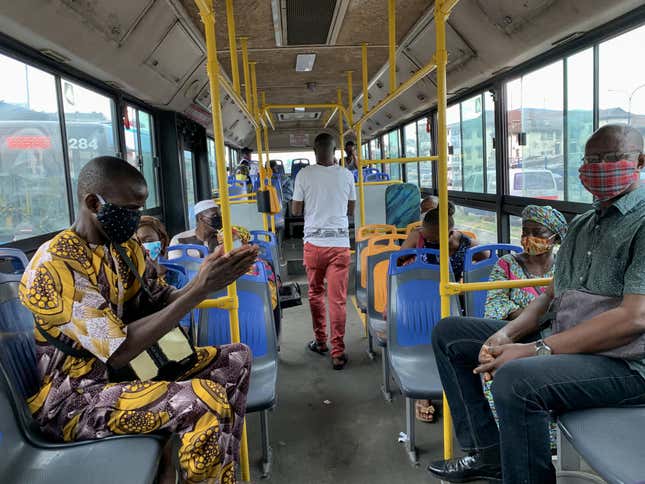
“I’m concerned about the long-term scarring on African PE fundraising and investing,” says Tokunboh Ishmael, founding partner of Alithiea Capital, which has so far raised $75 million to back businesses across the continent. She highlights one of the other major sources of investment capital on the continent: international development finance institutions (DFI) such as the UK’s DFiD or Germany’s GIZ. Ishmael expects there to be “a contraction with international DFI pools of capital as developed economies grapple with prioritizing the needs of the citizens and infrastructure of these economies.”
Investment deals are still getting over the line and funds are being raised, but many are believed to be with existing investees for later rounds rather than new prospects.
Consonance Investment Managers, a venture capital firm based in Lagos, has just launched its latest growth/early-stage fund with a target of $60 million. Its founder, Mobolaji Adeoye, is quietly confident that now is the right time to move ahead with the search for funds. “From what we have seen, the World Bank’s IFC and [US agency]
DFC are actively engaging fresh prospects. Others are investing in prospects which were already in their pipeline, given the difficulty of due diligence.”
Investors remain optimistic—even as they practice caution in uncertain times. Ishmael says the economic fallout from the pandemic has only strengthened his firm’s investment thesis for African markets, which prioritizes health, finance, education, agribusiness, and energy. “These are sectors that enable populations to reach their full potential and fuel economic growth,” he says.

Getting digitized
Another potential positive for African economies after the pandemic dissipates is the impact of basic services being digitized. Over the last decade, the continent has been at the forefront of a “Next Billion” transformation, referencing the next billion people to come online, largely from developing countries. Across Africa, tens of millions of people are getting their first taste of the internet as they upgrade from basic mobile phones to affordable smartphones.
Coming online hasn’t always meant people were living and working online. Many Africans have found internet data fees too expensive, relative to their earnings, to spend vast amounts of time online casually browsing. Even with a strong culture of fintech innovation, paying for things online has remained an issue in countries where cash remains king and credit and debit card usage is low.
The pandemic and subsequent lockdowns have changed attitudes significantly, with more of the urban middle class having to working at home and trying e-commerce for the first time.
This is having an impact in all kinds of sectors. Remittances from the African diaspora have typically been a significant source of foreign exchange into African economies over the last couple of decades. The World Bank has forecast remittance flows will drop by 23.1% to $37 billion this year.
But internal forecasts by some remittances industry leaders show the fall will have more of an impact on funds that used to be collected in cash at local outlets. One insider at a digital remittances firm, who spoke on background, said there has been a notable jump in app downloads and inquiries, as well as a sharp rise in mobile money use in certain markets since the pandemic started. The current internal estimate is cash remittances will drop by 50% while digital flows will rise by 30% to 40%.
With an estimated 100 million informal workers at risk from the economic impact of the crisis, McKinsey’s Leke sees the crisis as a vital opportunity for African governments to use digital tools to help formalize their economies and to support micro, small, and mid-sized businesses. “Today only about 15% of Africa’s estimated 90 million small to medium sized enterprises are registered. The crisis offers a chance to change that: with registration being a prerequisite for accessing government relief, many MSMEs may now see the benefits of entering the formal economy.”
A few countries have moved ahead with this, offering social welfare support digitally, some for the first time. Togo, in West Africa, launched a digital cash transfer program last month which is being watched closely by other countries in the region. The Novissi program sees the state transfer the equivalent of about 30% to 35% of minimum wage bi-monthly via mobile phones to informal workers whose daily revenues had been disrupted by the pandemic restrictions.
In its first two weeks, up to 1.1 million Togolese citizens registered for the scheme, according to the government. More than 450,000 eligible beneficiaries received initial payouts via mobile money. Of the eligible beneficiaries, 65.2% were women. The government paid out around $4.3 million in the first week and has promised to keep paying out for as long as the state of emergency declared by the president Faure Gnassingbé earlier this month continues.
“It’s good to see several governments putting in place safety nets for the first time,” says Zinsou. Togo’s program “is affordable, manageable, and formalizes part of the informal sector.”

Locked-down economies
Many African leaders put their countries into strict lockdowns to give them space as they scrambled to deal with the health and economic consequences of the pandemic. Early on, South Africa’s president Cyril Ramaphosa, and Ghana’s president Nana Akufo Addo, were praised for being forthright about the sacrifices they were asking citizens to make to get through the early days of this crisis.
Those sacrifices are immense. Social distancing and city-wide lockdowns are difficult enough to achieve in wealthy countries. But in many African countries, they are directly life-threatening for people who survive day-to-day by working predominantly in the informal sector. Staying closed for an extended length of time was never a realistic option.
Within a week of the first lockdowns going into place, the common refrain heard from Lagos to Nairobi to Johannesburg was that more people would die from hunger or at the hands of overzealous policemen than from Covid-19 itself.
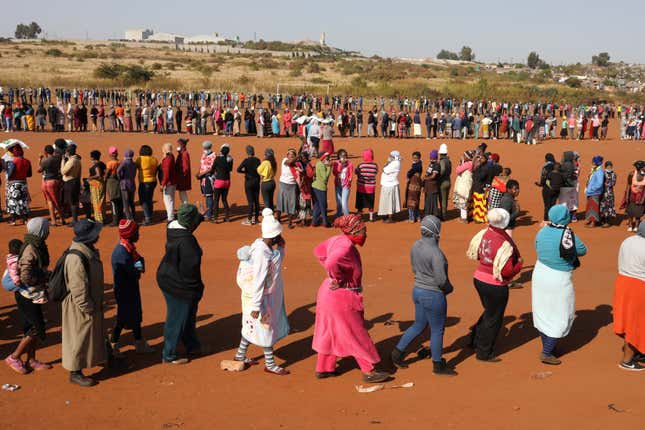
CGD’s Moore, a former Liberian public works minister, has described the lockdown strategies as “unfeasible, impractical, and arguably counterproductive in low-income countries, especially across sub-Saharan Africa.” He says African countries could have adapted their restrictions to the realities of their countries using measures such as targeted curfews. “Millions of Africans are unable to survive without some form of daily trade and don’t have the advantages of bank savings, credit cards, and online commerce to be able to stay indoors or ‘social distance’ for extended periods.”
Up to 90% of daily livelihoods are driven by the informal sector in some countries, according to UNECA and other agencies. That’s why Ghana, then South Africa and Nigeria, have eased back on restrictions in the face of growing unrest, even as the number of Covid-19 cases has risen.
Even in the few countries where there haven’t been strict shutdowns, the impact has been devastating. Zambia, a landlocked country, has been impacted by lockdowns in neighboring countries Zimbabwe and in the region’s largest economy, South Africa, notes Musonda of Java Foods in Lusaka. “Some of us wish we had a lockdown to justify the economic malaise, especially with the breakdown in supply chains from South Africa. Our economy has shut down regardless of whether we did or not.”
Like the rest of the world, African governments are delicately balancing reopening a functioning economy with long-term safety measures. McKinsey describes this process as “developing and flexing a muscle,” as governments “build the capacity to alternate between reopening and restricting economies on a granular, local level.”
Moore recommends clear rules, including mandatory mask-wearing, and maintaining current efforts to enforce gathering restrictions and reduced capacity on public transport. But as elsewhere in the world, African countries are going to need extensive testing, contact tracing, and eventually a cure or a vaccine.
Ultimately, the challenges of this global health crisis for African countries haven’t necessarily been about the health of their citizens, but about the wellbeing of their balance sheets. The fallout could be devastating, but could also lead to some positive, transformative effects if handled with strategic competence from governments, policymakers and the private sector.
Renaissance Capital’s chief economist, Charlie Robertson, expects that in a few years we will be able to look back at the growth rates of African countries and contrast them favorably with the developed markets of Europe and America. “If investors are looking for countries that are a bit less sensitive to shocks in this coronavirus crisis, like in the global financial crisis, they should be looking to Africa.”
Sign up to the Quartz Africa Weekly Brief here for news and analysis on African business, tech and innovation in your inbox
